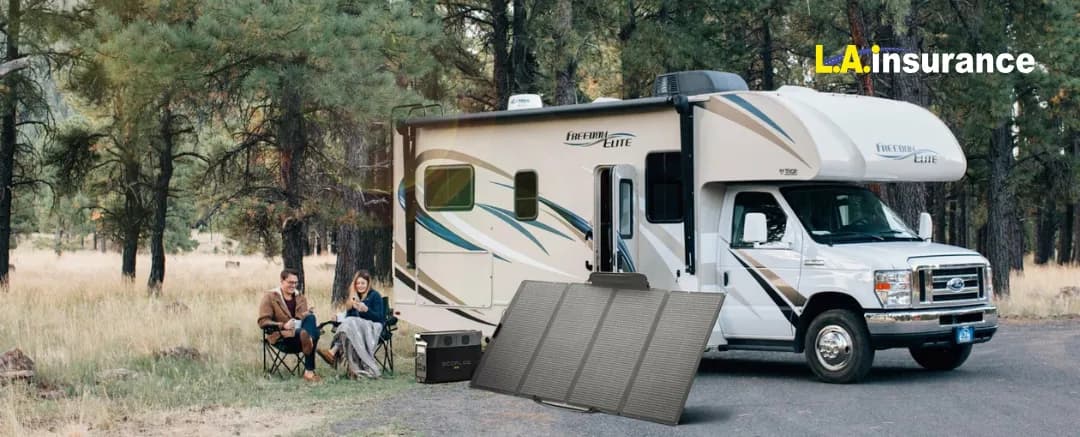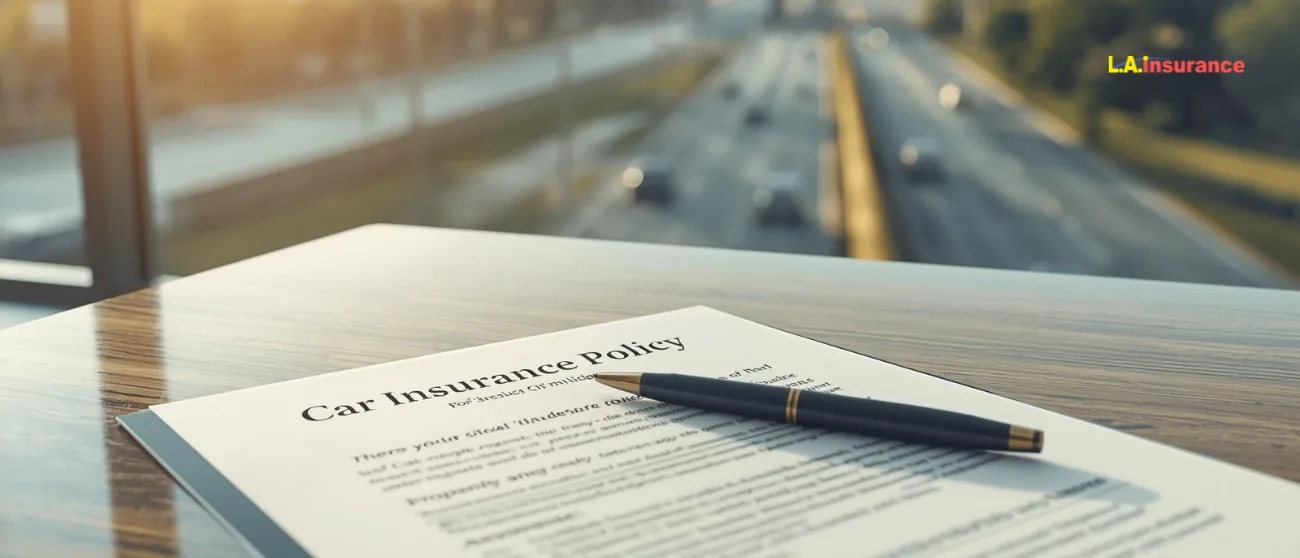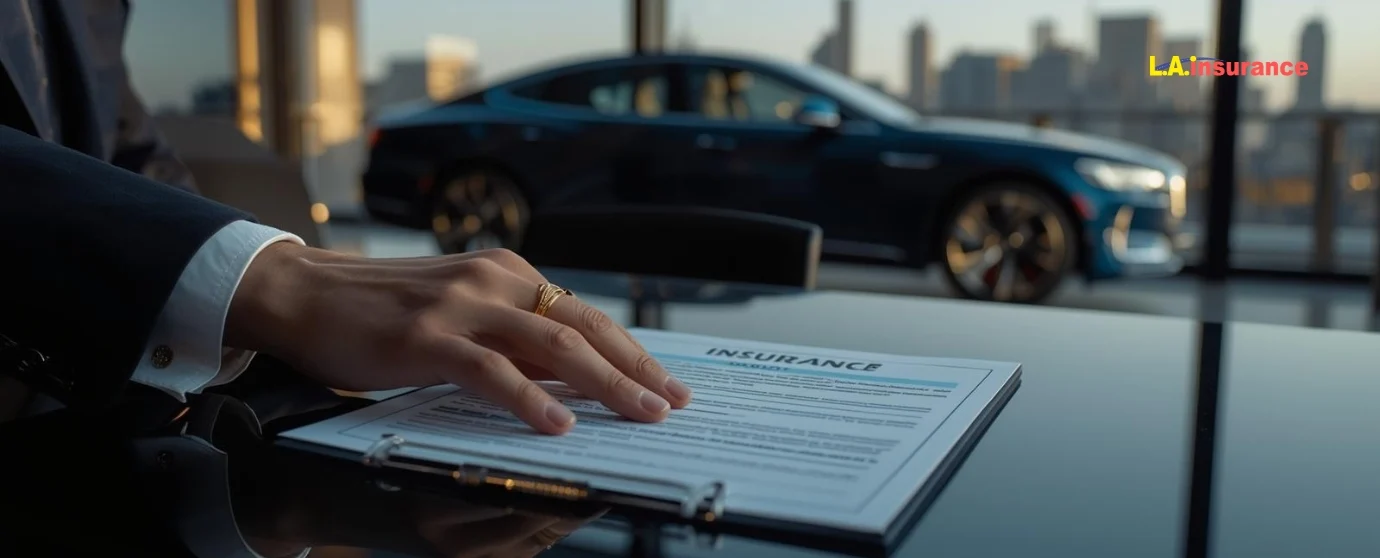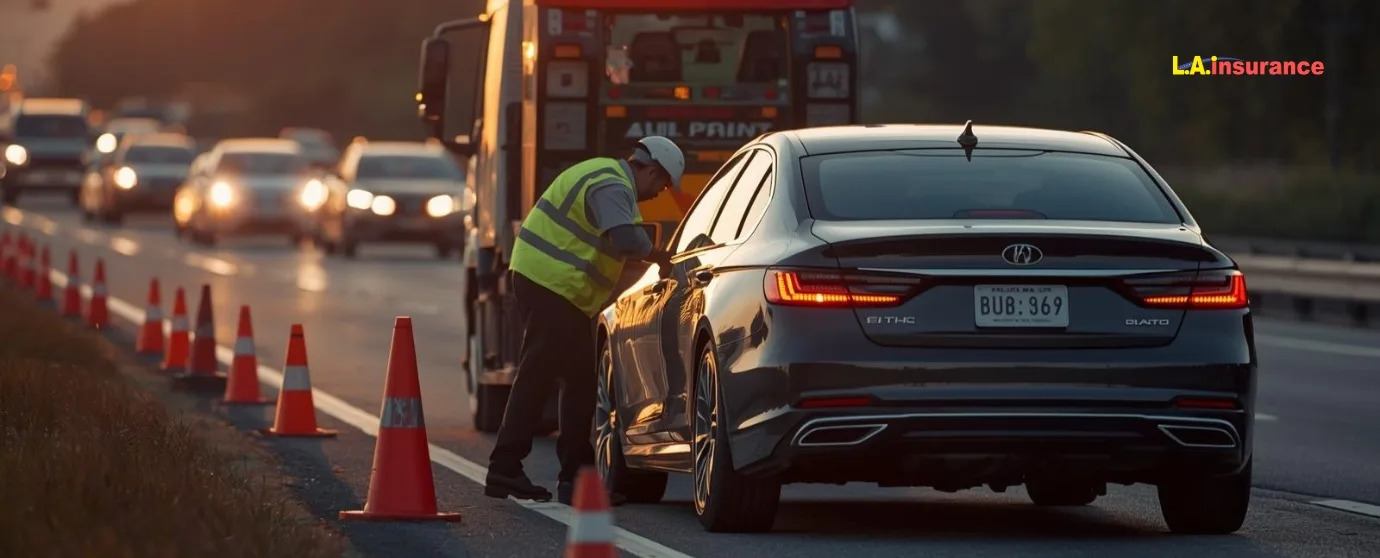
Publish Date: 12-08-2025
RV & Motorhome Insurance
Last Updated: 15-12-2025
What Is Full-Time RV Insurance and What Does It Cover?
Nowadays many Americans are using RV for living. According to Consumer Affairs, 11.2 million U.S. households own an RV. And when it comes to full-time RV living, the numbers are rising quickly. A Statista report shows that 3.1 million people live full-time in RVs, vans, or converted motorhomes, a 63 percent increase over the past few years.
This growing love for adventure and freedom is inspiring, but it doesn’t come without risk. Property damage, theft, vandalism, weather hazards, and unexpected injuries are all real challenges when living life on wheels.
To cover these risks, full-time RV insurance becomes very essential. It's designed to offer financial protection for your ever-moving home. In this guide, we’ll break down what full-time RV insurance is, what it covers, how it differs from part-time policies, the cost, the benefits, and how and where you can get your quote almost instantly, and more.
Full-Time RV Insurance Explained
Full-time RV insurance is a specialized policy for people who live in their RVs as a primary residence. If you use your motorhome, trailer, or campervan for six months or more per year, this coverage is for you.
You can think of it as homeowner's insurance but crafted for your recreational vehicle. Because you’re not only traveling but also living in it permanently.
Full-time RV insurance isn’t legally required, the way liability insurance is for all self-propelled motorhomes in most states. But it can be really useful in many scenarios.
For example, imagine a neighbor stumbles on your RV’s step while visiting. In this case, a basic auto policy might not cover their medical bills if needed. But if you have full-time RV insurance, you’ll get the compensation.
This becomes possible because full-time RV insurance usually includes personal liability, medical payments, and even loss assessments if you’re parked in an RV community. It protects you whether you’re on the road, at a campsite, or parked long-term.
If you’re an adventure lover or simply living in your RV full-time, you should definitely ensure financial safety for all the risks that might happen to you or your motorhome. Get a full-time RV insurance quote instantly from L.A. Insurance and make sure you’re in safe hands when it matters most. Our affordable insurance agency, based in Detroit, MI, specializes in offering not only the cheapest but also the most reliable RV and motorhome insurance for you. Dial (800) 893-9393 to get in touch with us.
What Does Full-Time RV Insurance Cover?
Full-time RV insurance covers more than a typical auto or recreational policy. It’s built to protect your home on wheels. At its core, it includes:
- Personal Liability RV Insurance
- Collision Insurance Coverage
- Comprehensive Insurance Coverage
- Medical Payments Coverage
- Loss Assessment Coverage
- Emergency Expense Coverage
- Personal Belongings Coverage
- Vacation Liability Coverage
Please keep in mind that every RV insurance provider may design their full-time RV insurance coverage differently. So, it’s important to check the policy terms or talk to your insurer directly to understand what coverage is included in your policy.
Now let’s explain each of these coverages and how they help you financially in diverse scenarios.
Personal Liability RV Insurance
It covers you if someone gets injured in or around your parked RV. It also helps you cover crashes where you’re at fault and cause physical injury or property damage to others.
Example: Let’s say you’re parked at an RV campground in Michigan. A friend steps out of your rig, trips on your stairs, and breaks their wrist. Without it, you could be held financially responsible for their injuries and legal costs.
Collision Insurance Coverage
According to the National Highway Traffic Safety Administration (NHTSA), around 76,000 RV crashes occur each year in the United States. And that’s why collision insurance is so important. It pays for accidents (RV damage) regardless of fault, whether you crash with another car or object. However, this coverage isn’t very useful for you if you choose stationary RV living.
Example: Let’s say you’re pulling into a gas station in Nevada. You misjudge the turn and clip a concrete post. Your RV’s side panel is crushed, and your bumper is hanging. But you don’t need to worry about money if you have collision insurance.
Whether you hit another vehicle, a tree, a guardrail, or a parking lot post, this coverage helps pay for repairs to your RV.
More>> Does RV Insurance Cover Water Damage?
Comprehensive Insurance Coverage
Comprehensive RV insurance coverage pays for non-collision-related losses like:
- Theft of your RV
- Vandalism
- Fire
- Hail damage
- Natural disaster
- Falling objects (e.g., a tree branch)
- And even animal damage
Example: Imagine you parked your RV overnight near a hiking trail in Colorado. A windstorm hits. A huge branch crashes through your roof, and your skylight shatters. In this scenario, comprehensive insurance will pay for it.
More>> Does RV Insurance Cover Awning Damage?
Medical Payments Coverage
Apart from liability-only, your full-time RV insurance often also includes medical payments. It pays medical bills for you and your guests/passengers hurt inside or near your RV, regardless of fault. Medical expenses typically include hospital stays, doctor visits, ambulance fees, and even funeral costs in a worst-case scenario. Sometimes it may even help you pay your deductible for health insurance.
Example: Let’s say your neighbor's child runs inside your RV during a cookout and slips, hitting their head on the countertop. In this situation, medical payment coverage pays for hospital visits even if you weren’t at fault. It’s simple, or better to say, a no-drama way to handle unexpected injuries near or inside your RV.
Loss Assessment Coverage
It’s an optional add-on that might be included in your full-time RV insurance policy. It helps if your RV park’s HOA or RV associations charge fees for shared property damage.
Example: Suppose you’re parked in a gated RV community in Texas. A storm rips through and damages the shared clubhouse and picnic shelter. The HOA sends every resident a $1,200 bill to help with repairs.
In a scenario like this, loss assessment coverage helps. Your insurer could pay the tab, usually up to $5,000, depending on your policy.
Emergency Expense Coverage
If your RV can't be lived in because something goes wrong, like a mechanical breakdown, fire, power outage, or evacuation, emergency expense insurance can help cover hotel costs, meals, or transportation. This usually applies if you're at least 50 miles away from your primary residence. Many popular RV insurers offer up to $750 under this coverage.
Example: Let’s say a fire damages your motorhome’s kitchen while you’re in Florida, making it unsafe to live in. In this case, emergency expense coverage helps you pay for hotel stays, meals, and travel while your RV is being repaired.
Personal Belonging Coverage
Personal property coverage is often included in full-time insurance for RVs. It offers protection for your clothes, gear, gadgets, and valuables inside the RV.
Example: Suppose you’re in Michigan. While hiking, someone breaks into your parked RV and steals your laptop, camera, and camping gear. In this scenario, personal belongings coverage will help replace the stolen items, up to your limit. It’s like having renters insurance built right into your RV policy.
Vacation Liability Coverage
It covers accidents while you’re parked at a campsite or RV resort.
Example: Let’s say you’re parked at a campsite in Texas. You’re tossing a football, and it crashes into your neighbor’s trailer window. In this scenario, vacation liability covers the damage or injuries to others while your RV is parked for recreation.
More>> What Is Vacation Liability RV Insurance?
What Does Full-Time RV Insurance Not Cover?
Full-time RV insurance offers solid protection. However, it doesn’t cover every situation. For example, any intentional damage to your RV won’t be covered by your insurer under full-time RV coverage. Here’s what’s usually excluded:
- Wear and tear: Aging parts, rust, or roof leaks from long-term use.
- Mold or rot: Damage from poor ventilation or moisture buildup.
- Infestation: Rodents, bugs, or animal damage inside the RV.
- Business use: Running a business out of your RV? You’ll need extra coverage.
- Illegal activity: Any damage caused while driving under the influence or breaking the law.
- Intentional damage: Claims from self-caused harm are denied.
Also, any maintenance issues like a dead battery or flat tire usually aren’t covered unless you add roadside assistance.
Full-Time RV Insurance Vs. Short-Term RV Insurance: Key Differences
Full-time RV insurance isn’t the same as insurance for part-time RVers. The difference comes down to how often you use your RV and what risks you face.
Here’s a side-by-side comparison:
Feature | Full-Time RV Insurance | Short-Term RV Insurance |
Usage | Living in RV 6+ months/year (primary residence) | Occasional use: vacations, road trips |
Liability Coverage | Includes personal liability, like home insurance | Limited to when the RV is driving or at campsites |
Medical Payments | Covers injuries in/around the RV, even when parked long-term | Covers injuries mainly during travel or short stays |
Loss Assessment | Helps with HOA or park community fees for shared area repairs | Usually not included |
Emergency Expenses | Pays for hotels, meals, and transport if the RV is unlivable | Not typically included |
Personal Belongings | Offers higher limits, ideal for full-time living items | Often limited; some belongings may need separate coverage |
Pet Coverage | May be included for pets living in the RV (some states) | Rarely included |
Cost | Higher premiums, due to increased coverage and risk | Lower premiums, less risk, fewer coverages |
Insurance Type | Hybrid of home, auto, and liability coverage | Mostly treated like auto insurance with optional RV add-ons |
Best For | People who live and travel in their RV full-time | Casual RVers, weekend warriors, vacationers |
Benefits of Having Full-Time RV Insurance
Living full-time in an RV means your risks aren’t part-time. And maintaining a full-time RV insurance means you’re fully protected on and off the road. Here’s why full-time RV insurance is worth it:
- Covers more than the road: You're protected whether parked, sleeping, or driving.
- Acts like home insurance: Includes personal liability, medical payments, and property coverage.
- Protects your lifestyle: Pays for emergencies, theft, and even losses inside RV parks.
- Peace of mind: You focus on travel, not what-ifs.
- Required by some lenders: If your RV is financed, full-timer coverage might be a must.
- Custom-fit protection: Coverage can be tailored to your RV type, location, and living style.
How Much Is Full-Time RV Insurance?
The cost of full-time RV insurance usually varies based on many factors, including the state where you live, your RV type, insurance provider, coverage limit, claim history, and so on. However, on average, full-time RV insurance ranges from $1,500 to $4,000 per year.
Cost can wildly vary by the type of RV you own. For instance:
- Class A Motorhomes: $1,500-$3,000+
- Class B Campervans: $500-$1,000
- Class C Motorhomes: $600-$$1,500
- Travel Trailers and Fifth Wheels: $300-$1,000
These are just ballpark figures. Exact pricing depends on your driving history, location, RV size, coverage limits, insurance provider, credit score, and even where you store your RV.
More>> How Much Does RV Insurance Cost?
When Do You Need Full-Time RV Insurance?
Now that you know RV insurance costs, you might be wondering whether to get one. So, do you really need full-time RV insurance? The answer is it depends.
You need full-time RV insurance if your RV isn’t just for travel. You use it as your permanent living space or home. Plus, if you live in your RV for 6 months or more each year, most insurers will classify you as a full-timer. And that changes everything.
Because you’re not just driving. You’re parking, sleeping, cooking, and living full-time on wheels. That means more risk, which naturally demands more coverage.
Other signs you need full-time RV insurance:
- You sold your house or don’t rent anymore
- You receive mail at RV parks or use mail-forwarding
- Your RV is your legal domicile
More>> Do You Have to Have RV Insurance?
Factors to Consider When Choosing Full-Time RV Insurance
Picking the right full-time insurance for a recreational vehicle isn’t just about price. It’s about making sure the right kind of protection for the way you live.
Here are the key factors you should consider while choosing RV insurance as full-timers:
- Consider your RV type and value. Bigger rigs (like Class A motorhomes, luxury RVs) need more coverage than a teardrop trailer. Remember, the higher the value, the higher the risk.
- Usage and travel habits matter. Do you move weekly or stay months at one park? If you move too frequently, you’re more prone to accidents, theft, and roadside issues.
- Consider coverage limit and deductible. You should choose a low deductible only if you’re ready to face higher premiums or you’re unsure whether you can pay the deductible if something goes wrong. Choose what fits your financial comfort zone.
- Location and weather risk are real. Your zip code matters. If you’re in a state like Florida or Texas, you’re most likely to face higher premiums due to higher risks of floods, storms, and higher RV traffic.
- Check your personal property protection. Make sure your full-time RV policy covers everything inside, including your laptops, cookware, clothes, tools, and other valuables.
- Reputation of the insurance company. Check customer reviews, claim handling speed, and real-world support. Price means nothing if the claim process is a nightmare.
- Roadside and emergency expense coverage. As a full-timer RVer, these extra add-ons are very handy, especially if your RV breaks down or becomes unlivable far from home.
- Pet coverage (though optional in some states). If your dog or cat travels with you, see if pet injuries are covered during accidents.
- Take advantage of discounts and bundles. Some insurance companies offer multi-policy discounts, safe driver rewards, or price breaks for memberships (like the Family Motor Coach Association).
How to Get a Full-Time RV Insurance Quote?
It’s easy to get a full-time RV insurance quote. In fact, you can get it within a few minutes. You just have to share a few details which include:
- Your RV’s VIN (Vehicle Identification Number)
- Your driver’s license
- Details on how you use your RV (full-time or not)
- Info about your RV type, make and model
- Your storage location and travel plans
- The name of your lienholder, if financed
- A major credit or debit card (If you’re ready to buy)
Please note that you must disclose that you live in your RV full-time. Hiding this info could lead to denied claims.
Are you a full-time RVer looking for cheap RV and motorhome insurance? You deserve a quote you can trust. At L.A. Insurance, we’ve served over 10 million policyholders across the U.S. for more than 33 years. Dial us at (800) 893-9393 or talk to an insurance agent in your area to discuss your RV insurance needs.
A Few Tips for Full-Time RV Living
Living in an RV full-time can feel freeing, but it also requires some adjustment. Here are some helpful tips:
- Declutter often. Space is tight. Keep only what you love or use.
- Go paperless. Set up digital billing and mail-forwarding early on.
- Budget realistically. Gas, campsites, and repairs add up fast.
- Pick your domicile wisely. States like Texas, Florida, or South Dakota are popular for full-time RVers.
- Stay flexible. Weather, Wi-Fi, and road closures will test your plans.
- Keep a repair fund. Something will usually break at the worst time.
- Connect with the community. RV life can get lonely. Meetup groups and RV clubs help.
And last but not least, enjoy the ride. Freedom is real, and so are the memories.
Is Full-time RV Insurance Worth It?
Absolutely. If you live in your RV full-time, full-time coverage is really useful. It protects you from risks like accidents, theft, vandalism, and weather damage while you’re on the road. It also includes emergency expenses and personal property coverage, which ensures your RV and its contents are safe during adventures. And it’s not that costly either. So, yes, if you’re using your motorhome as your permanent residence, having full-time RV insurance is definitely worth it.
FAQs about Full-Time RV Insurance Coverage
What does full-time rving mean?
Full-time Rving means living in your RV, motorhome, campervan, or trailer for six months or more per year. It means your RV is not just used for vacation. It’s your primary residence.
Can you rent out your RV on marketplaces with full-time coverage?
Most personal RV insurance policies don’t cover rental use. Because this is seen as a commercial activity and voids the claim. You’ll need specialized commercial rental insurance or verify with platforms like L.A. Insurance.
Does full-time RV insurance protect you when your RV is parked?
Yes. Full-time RV insurance includes vacation liability, personal liability, medical payments, and coverage for parked risks like theft, fire, and vandalism.
Who offers the best and cheapest full-time RV insurance?
While L.A. Insurance, Progressive, Good Sam, and Roamly are top providers, the cheapest depends on your state, RV type, and coverage requirement. Make sure to get quotes from us and compare them to get the cheapest coverage.
Do full-time RVers need separate health insurance?
Yes. Full-time RVers often lack employer coverage. They should carry health insurance, private, ACA marketplace, or medevac plans, for proper protection outside of the RV policy.
Should you tell or not tell insurance you are full-time?
Always be honest. If you don’t disclose full-time use of an RV, you risk claim denial or policy cancellation for insurance fraud.
Does full-time RV insurance cover items inside?
Yes, it includes personal belongings like electronics, clothes, and gear. It is similar to renters insurance but offers higher coverage limits than short-term RV policies.
How to choose the best RV insurance provider for full-time use?
Look for providers offering:
- Full-time liability and vacation liability
- Personal property protection
- Emergency expense coverage
- Reputation for fast claims handling
- Compare quotes and service records for true value
Editorial Disclaimer
The information provided on this blog is for general informational purposes only and does not constitute professional insurance, legal, or financial advice. Coverage and rates are subject to individual eligibility, underwriting guidelines, and state availability. For specific questions regarding your policy or to get an accurate quote, please contact a licensed L.A. Insurance agent directly. We're an independent agency and not a direct insurance carrier. For more information on how we operate and handle your data, please see our Terms and Conditions and Privacy Policy.
Tag :
RV insurance
RV & Motorhome Insurance








